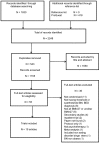The Efficacy of Psychological Therapies in Reducing Weight and Binge Eating in People with Bulimia Nervosa and Binge Eating Disorder Who Are Overweight or Obese-A Critical Synthesis and Meta-Analyses
- PMID: 28304341
- PMCID: PMC5372962
- DOI: 10.3390/nu9030299
The Efficacy of Psychological Therapies in Reducing Weight and Binge Eating in People with Bulimia Nervosa and Binge Eating Disorder Who Are Overweight or Obese-A Critical Synthesis and Meta-Analyses
Abstract
Recurrent binge eating episodes, the core feature of Bulimia Nervosa (BN) and Binge Eating Disorder (BED), are frequently comorbid with obesity. Psychological interventions, notably Cognitive Behavioural Therapy (CBT), are effective for binge eating reduction in BED or BN but less so for weight loss. Behavioural Weight Loss Therapy (BWLT) shows effectiveness for binge eating reduction and weight loss but the latter appears poorly sustained over time. Our aim was to review evidence for efficacy of psychological therapies for BN/BED associated with overweight or obesity in reducing binge frequency and weight. A systematic search for randomized controlled trials with adult samples who had BN or BED was conducted considering articles in English, French, Spanish and Portuguese with no restrictions for the timeline publication ending in March 2016. A quality appraisal of the trials and meta-analyses comparing BWLT to CBT were done. This review identified 2248 articles for screening and 19 published articles were selected. No trials of BN were identified. This review found CBT was favoured compared to BWLT with regard to short-term binge eating reduction. However, insufficient evidence was found for superiority for BWLT efficacy compared to CBT considering binge eating remission, reduction of binge eating frequency and weight loss. More research is needed to test the efficacy of psychological treatments for BED or BN with co-morbid overweight or obesity, including trials evaluating binge eating remission and weight loss in the long-term.
Keywords: binge eating; obesity; psychotherapy; weight management.
Conflict of interest statement
In the past PH, has received reimbursement of expenses for speaking at medical meetings and attending symposia from Astra-Zeneca, Solvay Pharmaceuticals, Bristol-Myers Squibb, and Pfizer Pharmaceuticals, and for educational training for family doctors from Bristol-Myers Squibb, Pfizer Pharmaceuticals and Lundbeck and has been funded by Jansen-Cilag to attend educational symposia (none since 2004). PH receives royalties from Hogrefe and Huber, McGraw Hill Education, Blackwell Scientific Publications, Routledge, Australian Doctor, and BMJ Pubs, for publications on Eating Disorders. She receives or has received honoraria from Biomed Central and PLOS Medicine for Editorial duties. PH is an author on six studies cited in this review. AMC received reimbursement of expenses for attending medical conferences from Lundbeck and Eli-Lilly in the past (none since 2010). MAP participated in one meeting of an advisory board for the treatment of Binge Eating Disorder at Shire Pharmaceuticals, São Paulo, Brazil in 2016.
Figures
References
-
- American Psychiatric Association APA . Diagnostic and Statistical Manual of Mental Disorders. 5th ed. American Psychiatric Association; Washington, DC, USA: 2013.
Publication types
MeSH terms
LinkOut - more resources
Full Text Sources
Other Literature Sources
Medical



